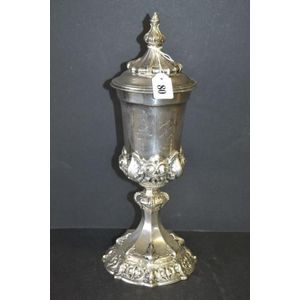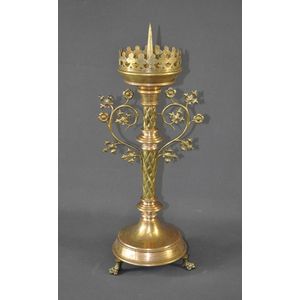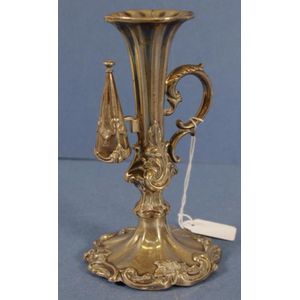Victorian Embossed Silver Candlestick with Snuffer
You must be a subscriber, and be logged in to view price and dealer details.
Subscribe Now to view actual auction price for this item
When you subscribe, you have the option of setting the currency in which to display prices to $Au, $US, $NZ or Stg.
- Sterling Silver - Sterling silver is a mixture of 92.5% pure silver and 7.5% of another metal, usually copper. Fine silver is 99.9% pure silver, and is relatively soft and the addition of the very small amount of copper gives the metal enough strength and hardness to be worked into jewellery, decorative and household objects.
- Embossed / Repousse - Embossing, also known as repousse, is the technique of decorating metal with raised designs, by pressing or beating out the design from the reverse side of the object.It is the opposite of chasing, where the decoration is applied from the front. An embossed or repoussed object may have chasing applied to finish off the design.
- Circa - A Latin term meaning 'about', often used in the antique trade to give an approximate date for the piece, usually considered to be five years on either side of the circa year. Thus, circa 1900 means the piece was made about 1900, probably between 1895 and 1905. The expression is sometimes abbreviated to c.1900.
- Victorian Period - The Victorian period of furniture and decorative arts design covers the reign of Queen Victoria from 1837 to 1901. There was not one dominant style of furniture in the Victorian period. Designers used and modified many historical styles such as Gothic, Tudor, Elizabethan, English Rococo, Neoclassical and others, although use of some styles, such as English Rococo and Gothic tended to dominate the furniture manufacture of the period.
The Victorian period was preceded by the Regency and William IV periods, and followed by the Edwardian period, named for Edward VII (1841 ? 1910) who was King of the United Kingdom and the British Dominions and Emperor of India for the brief period from 1901 until his death in 1910.
This item has been included into following indexes:
Visually similar items

German 800 grade silver lidded chalice with ecclesiastical decoration and Masonic inscriptions 1854/1875/1879, approx. 12 oz. troy

Gothic revival tall brass candle stick. Design attributed to A. W. Pugin. Trefoil patterned sconce with floral tendrils, diamond ptn column; on lion's paw feet. Unmarked. Height 53 cm

A Victorian silver trophy cup of baluster goblet form, repousse embossed, engraved with a monogram, the spreading hexafoil scallopped foot with leaf flange; Thomas Smily, London 1862. Height 22.5 cm. Weight approx 400g.

Edinburgh Crystal thistle liquor decanter, height 20 cm
